Fuel delivery apps are the future, but building one comes with its own hurdles.
Challenges in fuel delivery app development are everywhere—from dealing with complex logistics to ensuring the safety of the customers and employees.
It’s not just about delivering fuel; it’s about delivering reliability, security, and an experience that keeps users coming back.
But don’t worry; every challenge presents an opportunity to create something innovative. Whether it’s navigating local regulations or integrating seamless tech solutions, each obstacle can be turned into a feature that sets your app apart.
After all, in the world of fuel delivery, the race isn’t just about speed—it’s about precision and reliability.
This article will discuss the key challenges you’ll face while developing a fuel delivery app and how to overcome them for success.
Ready to hit the road? But before we jump to the challenges directly, let's first understand why having a fuel delivery app can be a fortune in 2025.
Why Should You Develop a Fuel Delivery App in 2025?
As the demand for convenience continues to grow, developing a fuel delivery app in 2025 is not just a smart move; it’s an essential one for staying competitive in an evolving market.
Here’s why:
1. Expanding Market Opportunity
The on-demand fuel delivery market is experiencing rapid growth, with projections indicating that it will increase from USD 0.33 billion in 2024 to USD 2.04 billion by 2032, reflecting a compound annual growth rate (CAGR) of 15.97% (Business Research Insights).
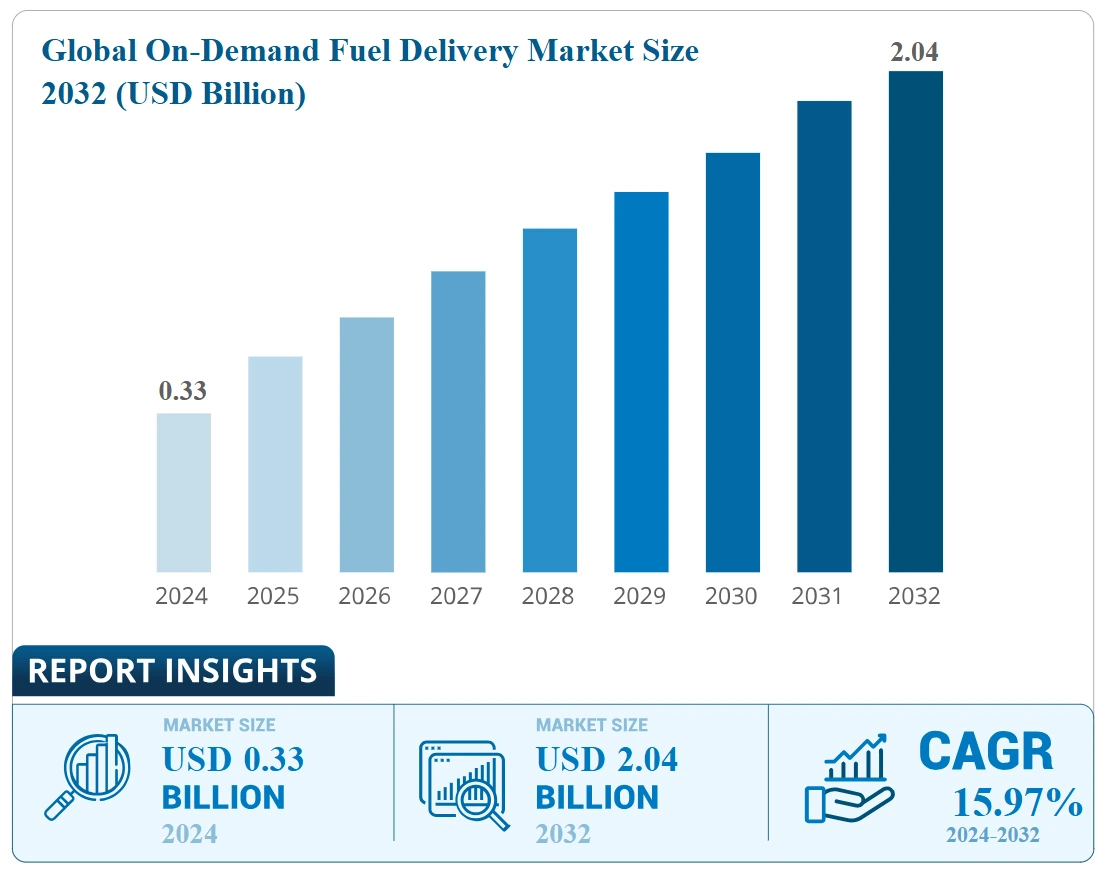
Moreover, the North American market is set to dominate this growth, fueled by urbanization and the fast-paced lifestyles of its consumers.
According to Cognitive Market Research, the global on-demand fuel delivery market is forecasted to reach USD 251.2 billion by 2031, growing at a CAGR of 18.20% from 2024 to 2031 (Cognitive Market Research).
2. Meeting Evolving Consumer Expectations
In 2025, consumers are no longer just looking for fuel; they are seeking a smooth, convenient, and transparent experience. Their expectations may include,
-
-
Real-Time Tracking: Consumers expect to track their fuel delivery in real-time, ensuring transparency and trust.
-
Flexible Delivery Windows: Customizable delivery schedules are essential for meeting the varying needs of modern consumers.
-
Secure Payment Systems: With an increased focus on security, offering a range of reliable payment options is crucial.
-
Sustainability: As eco-consciousness grows, consumers are increasingly favoring clean energy vehicles for fuel delivery.
-
These expectations are reshaping the way fuel delivery services operate, making it crucial for businesses to adapt and innovate.
3. Strengthening Customer Retention
Fuel delivery apps provide a user-friendly interface and reliability, contributing to enhanced customer satisfaction.
With half of urban users likely to continue using fuel delivery apps, it’s clear that providing this service boosts retention and increases customer loyalty.
4. Gaining a Competitive Edge
In a fast-paced, convenience-driven market, having a fuel delivery app positions your business as a modern, tech-savvy leader. Developing such an app not only enhances customer satisfaction but also strengthens your brand’s position against competitors.
In 2025, developing a fuel delivery app is not just an option—it’s a business imperative.
With the on-demand fuel delivery market expanding rapidly, meeting modern consumer expectations, and gaining a competitive edge, this strategic move ensures long-term growth and sustainability in this rapidly evolving fuel industry.
Key Challenges In Developing a Fuel Delivery App
Now that you have understood the importance of having a fuel delivery app. Let's now discuss the key challenges that affect the development of fuel delivery apps.
1] Logistics and Delivery Efficiency
An efficient logistics system and delivery coordination are important to make sure the services are delivered on time, and your customers remain satisfied.
-
-
Timely Delivery Coordination: Effective coordination between fuel providers and drivers is essential to meet delivery windows.
-
Route Optimization: Using advanced algorithms to optimize delivery routes reduces costs and delivery time, improving overall service efficiency.
-
These are significant challenges in fuel delivery apps, which require innovation and technology to ensure smooth operations.
2] Compliance With Local Regulation
Adhering to government fuel regulations is important to ensure safety and legal operations in the fuel delivery industry. Fuel businesses must create complex safety and environmental standards to meet the legal requirements.
-
-
Government Fuel Regulations: These laws govern fuel quality, transportation, and storage, ensuring safety and environmental protection.
-
Safety and Environmental Standards: Complying with these regulations minimizes environmental impact and ensures safe handling practices during delivery.
-
Navigating these complexities is a significant challenge in fuel delivery apps, requiring constant updates and adherence to local laws
3] Data Security and Privacy Concerns
Protecting user data and transaction information is a top priority for any fuel delivery service. Customers entrust their personal details, so it’s crucial to implement robust security measures to prevent data breaches.
-
-
Protecting User Data: Encryption and secure storage protocols ensure that sensitive customer information is kept safe.
-
Complying with Data Protection Laws: Adhering to regulations like GDPR is necessary to avoid penalties and maintain trust.
-
These are critical challenges in making a fuel delivery app that businesses must overcome to ensure privacy and legal compliance.
4] Scalability and Performance
As fuel delivery services grow, handling increased demand is essential for maintaining service quality. The app infrastructure must be scalable to accommodate more users, locations, and transactions without compromising performance.
-
-
Handling Increased Demand: Fuel delivery businesses need robust cloud-based systems that can handle growing user bases and delivery requests.
-
Ensuring Smooth Performance at Scale: Optimized backend systems ensure that the app functions smoothly even under heavy loads, providing a seamless experience for both customers and drivers.
-
When hiring dedicated developers to build your app, it's essential to consider key challenges in fuel delivery app development, which require careful planning and technological solutions.
5] Fuel Inventory Management
Efficient fuel inventory management is essential for ensuring timely deliveries and preventing stockouts. Real-time tracking of fuel levels across various locations helps businesses stay on top of their supply.
-
-
Tracking Fuel Levels in Real-Time: Using advanced sensors and IoT technology, businesses can monitor fuel quantities and avoid over- or under-stocking.
-
Managing Multiple Locations Efficiently: Centralized systems allow companies to manage fuel inventory across multiple locations, optimizing deliveries and reducing waste.
-
This is a significant challenge in building a fuel delivery app, as it requires seamless integration of real-time data and inventory management features.
6] Payment Processing and Security
Payment processing is a crucial aspect of any fuel delivery service, and ensuring security is a top priority. A secure payment gateway is necessary to protect sensitive customer information during transactions.
-
-
Secure Payment Gateways: Integrating encryption and fraud detection systems ensures that payments are processed securely.
-
Handling Large Transactions and Multiple Payment Methods: Fuel delivery apps must support various payment methods, including credit cards, digital wallets, and bank transfers, while handling large transaction volumes seamlessly.
-
These are key challenges in creating a fuel delivery app, as secure and efficient payment systems are vital to building customer trust and ensuring smooth transactions.
7] Real-Time GPS and Tracking Accuracy
Real-time GPS tracking is essential for fuel delivery services to ensure accurate and timely deliveries. With GPS technology, businesses can monitor drivers' locations and optimize routes for efficiency.
-
-
GPS Tracking for Fuel Delivery: Real-time tracking ensures that fuel deliveries are completed on time and helps avoid delays by adjusting routes if necessary.
-
Fleet Management with Accurate Location Data: Accurate GPS data enables businesses to manage their fleet efficiently, monitor driver performance, and ensure fuel delivery arrives at the correct location.
-
These are significant challenges you face in fuel delivery app development, as accurate tracking is vital to optimize delivery times and improve customer satisfaction.
8] Customer Support and Service Reliability
Customer support plays a critical role in fuel delivery services, ensuring that users’ concerns are addressed promptly and efficiently. A strong support system helps maintain trust and satisfaction.
-
-
Handling Customer Queries and Complaints: Fuel delivery apps must offer multiple channels for customers to contact support, ensuring quick resolutions to issues.
-
Ensuring Reliable Service Delivery: Consistent service delivery is key to retaining customers, with timely responses and quick solutions to any challenges.
-
These are crucial challenges in building a fuel delivery app, as reliability and effective support systems directly impact customer loyalty and overall service quality.
9] Maintaining Fuel Safety During Delivery
Fuel safety is paramount during transportation to avoid accidents and environmental hazards. Stringent safety protocols must be followed to protect both drivers and customers.
-
-
Safety Protocols for Fuel Transportation: Ensuring that drivers are trained in proper handling and transportation methods reduces the risk of spills and accidents.
-
Preventing Accidents and Spills: Implementing safety checks, regular maintenance of delivery vehicles, and real-time monitoring helps prevent fuel leaks and accidents during delivery.
-
These are important challenges in making a fuel delivery app, as it’s crucial to integrate safety features and protocols that safeguard people and the environment during fuel delivery.
10] Driver Management and Training
Effective driver management is essential for smooth fuel delivery operations. Properly trained drivers are crucial to ensuring safety and efficiency during deliveries.
-
-
Managing Drivers Effectively: Monitoring driver performance through the app helps ensure timely deliveries and adherence to safety protocols.
-
Training Drivers for Fuel Safety and Delivery Efficiency: Providing comprehensive training on fuel safety and efficient delivery practices ensures that drivers minimize risks and optimize their routes.
-
These are significant challenges in creating a fuel delivery app, as integrating driver management features is vital for maintaining high standards of service and safety.
Solutions to Overcome Challenges in the Development of Fuel Delivery Apps
Now that you have understood the challenges faced while developing a fuel delivery app, it's time to explore the solutions that can help overcome these hurdles.
1) Optimizing Logistics and Delivery Efficiency
Optimizing logistics and delivery efficiency is crucial for success. One of the most effective solutions involves leveraging AI-powered route optimization, which can significantly reduce delivery times and costs.
-
-
Route Optimization and AI-Powered Solutions: By integrating AI technologies, fuel delivery services can optimize their routes dynamically, ensuring that deliveries are made promptly and efficiently.
-
Fleet Management Systems: Implementing advanced fleet management systems helps track delivery vehicles, monitor driver performance, and manage fuel inventory in real-time.
-
By combining these technologies, fuel delivery apps can overcome challenges such as delivery inefficiency, high operational costs, and delays. This also leads to improved customer satisfaction, making the entire process more reliable and cost-effective.
2) Navigating Regulatory Compliance
Staying updated with ever-changing laws and ensuring compliance with safety and environmental standards are important for maintaining smooth operations.
-
-
Staying Up-to-Date with Regulations: Fuel delivery apps must integrate tools that track local, regional, and international regulations, ensuring adherence to legal requirements. Regular audits and compliance checklists can further streamline this process.
-
Safety and Environmental Compliance: Businesses must invest in eco-friendly practices, such as using certified fuel storage systems and adhering to protocols for spill prevention. Ensuring drivers follow proper safety guidelines during transportation also minimizes environmental risks.
-
This is one of the most crucial challenges to consider while developing a fuel delivery app, and addressing it effectively ensures trust, legal compliance, and sustainable operations.
3) Securing User Data and Privacy
Protecting user data is essential for maintaining trust and ensuring compliance with regulations. Fuel delivery apps handle sensitive information like payment details, making robust security measures critical.
-
-
Encryption and Secure Payment Gateways: Encrypting all data during transactions and using secure payment gateways helps prevent breaches and fraud.
-
Data Protection Compliance (GDPR, etc.): Adhering to global standards such as GDPR ensures user privacy and protects businesses from penalties.
-
These are significant fuel delivery app development challenges, as strong data security measures are vital for user confidence and regulatory compliance. You can hire Android app developers to develop apps that adhere to these standards.
4) Ensuring Scalability and Performance
As demand for fuel delivery services grows, ensuring scalability and maintaining performance are critical for a seamless user experience.
-
-
Cloud Infrastructure and Load Balancing: Leveraging cloud-based platforms with load balancing ensures the app can handle increased traffic without downtime, enabling smooth operations during peak times.
-
Performance Monitoring Tools: Real-time monitoring tools identify and resolve bottlenecks promptly, ensuring consistent app functionality as user numbers scale.
-
These are vital challenges to consider while developing a fuel delivery app, as scalability and performance directly impact user satisfaction and operational efficiency.
5) Efficient Fuel Inventory Management
Managing fuel inventory efficiently is crucial for avoiding stockouts and ensuring timely deliveries.
-
-
Real-Time Inventory Management Systems: Advanced systems provide live data on fuel levels, helping businesses predict demand and restock proactively.
-
Fuel Stock Monitoring and Alerts: Automated alerts notify managers of low stock levels or discrepancies, preventing disruptions in the supply chain.
-
These are key challenges in building a fuel delivery app, as seamless inventory tracking ensures smooth operations and consistent service for customers.
6) Enhancing Payment Processing and Security
Secure and efficient payment systems are fundamental to building user trust in fuel delivery apps.
-
-
Multiple Payment Options and Secure Transactions: Offering various payment methods like digital wallets, credit cards, and bank transfers ensures convenience, while encryption guarantees transaction safety.
-
Fraud Prevention Mechanisms: Implementing fraud detection tools and transaction monitoring reduces risks, safeguarding user data and finances.
-
These are significant on-demand fuel delivery app development challenges, as payment security directly impacts customer satisfaction and retention.
7) Improving GPS and Tracking Accuracy
Accurate GPS tracking is vital for seamless fuel delivery operations.
-
-
Real-Time GPS and Location Accuracy: High-precision GPS ensures drivers reach the correct locations promptly, reducing delivery errors.
-
Contingency Systems for Delays and Disruptions: Backup systems and alerts provide alternative routes during unexpected delays, ensuring timely deliveries.
-
These are some of the top challenges in creating a fuel delivery app, as real-time tracking and proactive solutions greatly enhance service reliability and customer satisfaction.
8) Building Strong Customer Support Systems
Customer support is the backbone of any successful fuel delivery service.
-
-
Multiple Support Channels (Chat, Calls, Email): Offering diverse communication options ensures customers can easily get assistance.
-
Automated Systems for Fast Response: AI-driven chatbots and automated ticketing systems help resolve queries quickly, improving the user experience.
-
These are important challenges in making a fuel delivery app, as reliable support systems build trust and ensure customer loyalty.
9) Ensuring Fuel Safety During Delivery
Fuel safety is paramount to avoid accidents and ensure environmental protection.
-
-
Implementing Safety Protocols: Adhering to industry standards for fuel handling, spill prevention, and vehicle safety reduces risks during transit.
-
Proper Driver Training and Equipment: Equipping drivers with safety gear and providing thorough training on fuel transportation ensures safe delivery.
-
These are key challenges in building a fuel delivery app, as safety measures safeguard customers, drivers, and the environment while maintaining compliance with regulations.
10) Managing and Training Drivers
Skilled and well-trained drivers are essential for efficient fuel delivery operations.
-
-
Driver Behavior Monitoring: Using telematics systems to track driver behavior ensures safe and efficient driving practices.
-
Regular Training on Fuel Safety and Delivery Practices: Continuous training equips drivers with the knowledge to handle fuel safely and optimize delivery routes.
-
These are critical challenges in developing a fuel delivery app, as proper driver management directly impacts service quality and operational efficiency.
You can coordinate with experienced mobile app development service providers, as they can guide you with every challenge and help you create a market-fit fuel delivery app.
Case Studies of Successful Fuel Delivery Apps
Examining successful fuel delivery apps reveals how companies have overcome challenges to thrive in this competitive market.
► Yoshi: Operating in the U.S., Yoshi addressed challenges in creating a fuel delivery app by focusing on route optimization and customer engagement.
Leveraging advanced GPS and AI-driven logistics, they expanded their services to include car maintenance, setting a benchmark for diversification.
► Booster Fuels: This app tackled compliance and safety concerns by adhering to stringent regulations and prioritizing driver training. Their focus on workplace fuel delivery helped businesses reduce downtime, making Booster Fuels a trusted partner in the U.S. market.
► Cafu: Based in the UAE, Cafu managed current challenges in developing a fuel delivery app by implementing real-time inventory tracking and secure payment systems. Their user-friendly app design and rapid expansion demonstrate the importance of scalability and performance.
These apps highlight how overcoming operational, regulatory, and technological hurdles can lead to scalable and customer-focused solutions, paving the way for success in the fuel delivery sector.
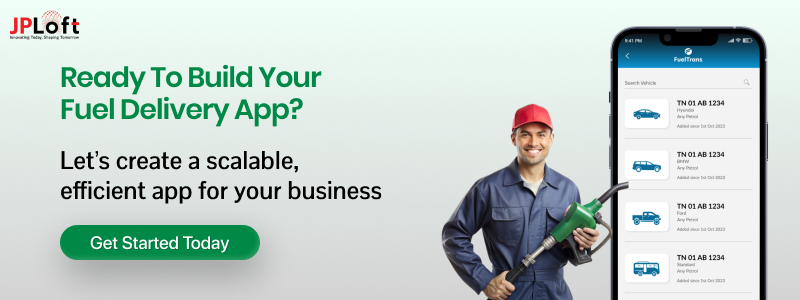 How Can JPLoft Help You Develop a Fuel Delivery App?
How Can JPLoft Help You Develop a Fuel Delivery App?
Looking to develop a reliable and innovative fuel delivery app? At JPLoft, a leading on-demand fuel delivery app development company, we specialize in crafting cutting-edge solutions tailored to your business needs.
Our expertise lies in tackling critical challenges in developing a fuel delivery app, including real-time GPS tracking, secure payment integration, regulatory compliance, and driver management.
With extensive experience in developing fuel delivery apps, we’ve successfully launched projects like 2U Fuel, a robust and scalable app designed to streamline fuel delivery operations.
We offer full-cycle app development, providing end-to-end services from conceptualization to deployment, ensuring a seamless experience. Whether you’re a startup or an established business, we provide comprehensive support every step of the way.
Ready to transform your idea into a successful app? Contact JPLoft today for expert consultation and development services. Let’s fuel your business growth with a world-class fuel delivery solution!
Wrapping Up
In developing a fuel delivery app, addressing key challenges such as logistics, regulatory compliance, and security is crucial for success.
Optimizing real-time tracking, ensuring data privacy, and implementing scalable solutions can help overcome potential obstacles. With the right strategies in place, fuel delivery services can grow, ensuring customer satisfaction and operational efficiency.
As the demand for on-demand services rises, investing in a fuel delivery app offers significant business potential. By understanding and tackling the challenges head-on, your app can thrive in this competitive market.
Focus on innovation, scalability, and security to build a successful solution.
FAQs
Use route optimization tools and real-time GPS tracking to improve delivery times and reduce fuel costs.
Stay updated with local fuel regulations and implement safety protocols and driver training to maintain compliance.
Implement encryption, secure payment systems, and adhere to data protection laws like GDPR for robust user privacy.
Use real-time tracking systems and automated alerts to monitor fuel levels and prevent stockouts, ensuring timely deliveries.
Provide comprehensive training on fuel handling and delivery safety, and use telematics to monitor driver performance and optimize routes.





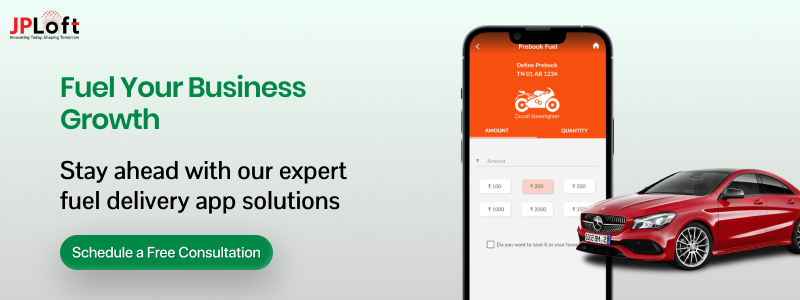
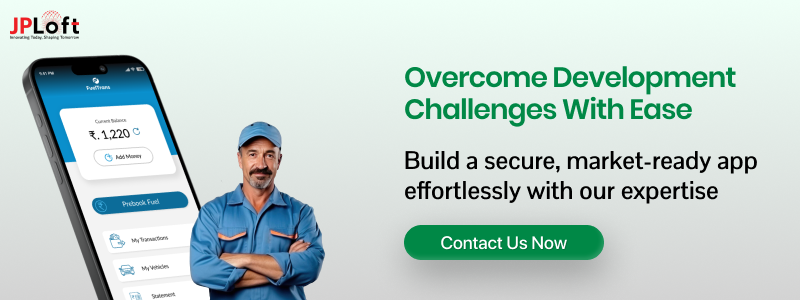

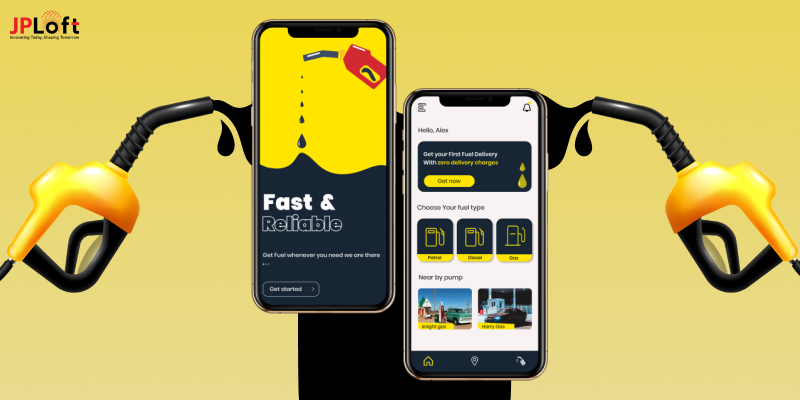
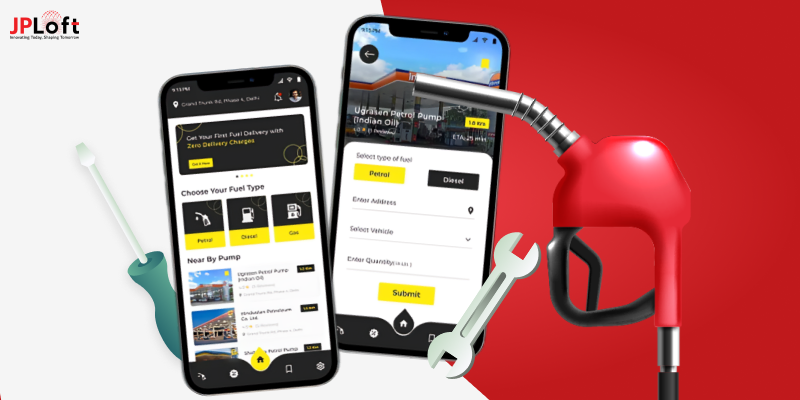
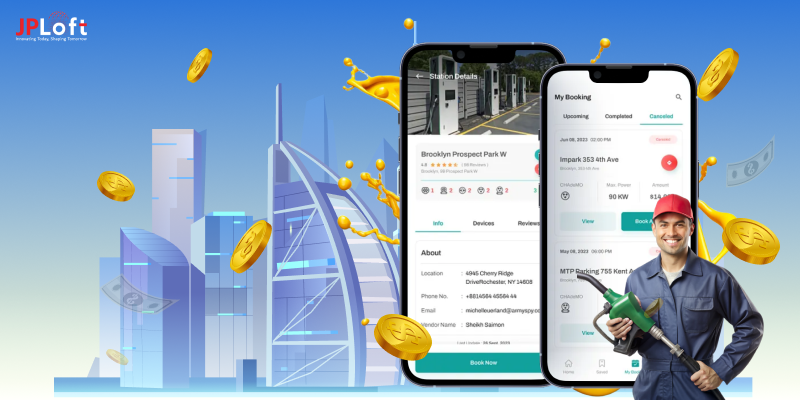



Share this blog